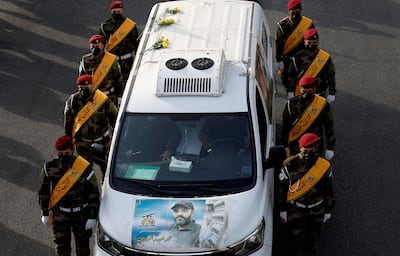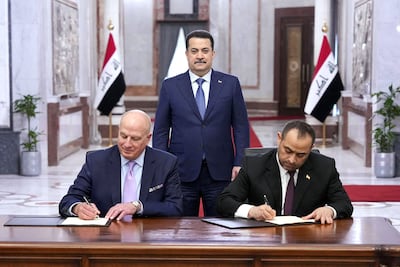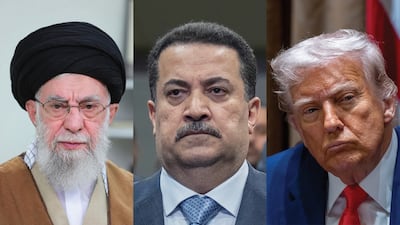Iraq is taking a multi-aligned approach with balancing regional ties, but will face challenges as pressure mounts from the US to limit relations with Iran ahead of nuclear talks on Saturday, experts and officials have told The National.
Over the past few months, Tehran’s influence in the Middle East has weakened as Iran’s allies in Gaza and Lebanon were heavily degraded following the killing of Hamas and Hezbollah leaders. The fall of Syria’s President, Bashar Al Assad, a long-time ally of Tehran, who was overthrown by rebels in December, has further diminished its influence while Yemen's Iran-backed Houthi rebels are suffering under a US bombing campaign.
The only state left is Iraq, which has been feeling the heat following calls by US Republican Representative Joe Wilson and Democrat Jimmy Panetta introduced the “Free Iraq from Iran” bill, calling for the creation of an “inter-agency strategy” on the subject.
This pressure on Iraq comes as Washington is preparing to head to Oman for vital talks with Iran this weekend. They will be centred on Tehran's nuclear activities and the influence it wields across the Middle East through allied armed groups.
“We know that out of all external actors, Iran is the most influential and embedded into Iraqi politics and the state, and so, if Iraq attempts to diversify, it goes against some Iranian interests,” Renad Mansour, director of the Iraq initiative at London’s Chatham House think tank, told The National.
Balancing act
Iraq's government is headed by Prime Minister Mohammed Shia Al Sudani who is part of the Co-ordination Framework, a coalition of political parties that are allied with Iran. However, since assuming office in 2022, Mr Al Sudani's administration has taken a balancing act which is complicated by the fragility of the state.
“For many years, Iraq has upheld the slogan of 'balancing foreign relations', particularly between Washington and Tehran. However, this principle was not as clearly defined in the past as it has become under the current government,” Iraqi government spokesman Bassem Al Awadi told The National.
Mr Al Awadi said Baghdad has been “striving to ensure that US-Iran tensions do not negatively impact Iraq or turn the country into a battleground for external conflicts”.
“The Iraqi government in general does not want to fall under any one single sphere of influence,” Mr Mansour said, adding that Iran still has big allies in Iraq. For Iran, Baghdad is an important and strategic state.
“It offers Iran access to, international financial markets and is also a way to export all sorts of commodities, including oil and gas. If the Iraqi government could develop some sovereignty, it could start to push back,” Mr Mansour said.

Mr Awadi added that “both nations recognise Iraq’s deep commitment to maintaining its independence across various sectors”.
In response to the upcoming US-Iran talks, the Iraqi official said Baghdad “welcomes any negotiations or dialogue between Washington and Tehran and has expressed its willingness on multiple occasions to support efforts that would lead to mutual understandings and to help the region avoid further wars”.
Opportunities elsewhere
Baghdad is aiming to diversify its energy supply from Tehran especially as Washington has removed the sanctions waiver allowing Baghdad to import electricity from Iran while leaving the exemption for Iranian natural gas in place.
“Under maximum pressure and US efforts to constrain Iran, there is certainly an opportunity for the Iraqi government to diversify its economic relationships and strengthen economic and security co-operation with other countries and the US,” Sanam Vakil, director of the Middle East programme at London's Chatham House, told The National.
“We should not see these moves as zero sum though as Tehran's network is deep and equally diversified across the country,” she said.
This week, Iraq signed two agreements with two US companies to produce 27,000 megawatts of electricity a month as the summer approaches to avoid electricity cuts. Iranian electricity and gas imports, which accounted for up to 40 per cent of Iraq's power supply in 2023, are essential to meet the country's energy needs.
“It's no news that Baghdad wants to diversify its energy supply from Tehran, even if it wants to maintain relations and not necessarily cut all its ties. The MOUs are definitely another move in that direction,” Aniseh Tabrizi, an Iran-Iraq expert at Control Risks, told The National.
“However, we also know that this is not something that can happen overnight. Despite all the pressure and efforts, Baghdad is likely to remain reliant on Iran for energy supply for a while,” she said.
Iran will make sure that ties with Iraq remain strong despite its weakened role in the role, said the expert.
Lukewarm ties
Relations between Baghdad and Washington remains lukewarm with no high-level meetings or visits taking place from President Donald Trump’s administration until this week when a top trade delegation visited Baghdad.
It is believed that Mr Trump views Iraq as part of the Iran file and the clear indication to that is the National Security Presidential Memorandum he signed to restore the maximum pressure on Iran which refers to its allied armed groups in the region.
So far, Mr Al Sudani’s government has not managed to make a breakthrough in the relation with Washington, especially when it comes to the dismantling of Iran-backed militias or merging them into the security forces.
“The new deals with a GE Vernova and UGT Renewables could take the relations forward somehow,” a senior Iraqi diplomat told The National.
“Trump was very keen during his first term in office to secure deals with GE and pushed for that, and yesterday’s signings could open a wide path in the relations between the two countries,” he said.
With regards to deals with US energy companies, he said they were aimed at developing green oil and gasfields. “Progress may be delayed in the political front, but we can move fast on the economy and energy one,” he said.

Baghdad has engaged in talks with Tehran-allied armed factions – one of the key demands for Washington – but no major progress has been made so far as “it is not an internal affair”, he said, referring to Iran role. Discussions are under way between political parties, the government and the armed factions, the diplomat added.
“The general mood inside Iraq is towards strengthening the state and putting an end to the non-state, taking into consideration the regional developments otherwise we will face consequences,” the diplomat said.
But the Iraqi parliament is considering a bill to cement the role of the Popular Mobilisation Forces, a coalition of militias dominated by groups with ties to Iran, as a fully-fledged arm of the state's security forces.
Iran has largely extended its influence through the PMF and armed groups under its umbrella but the countries have a long history and share a border that runs thousands of miles.
Since the 2003 US led invasion, Tehran's influence in Baghdad increased both politically and economically. Especially as Iran has supported Shiite armed groups that formed part of the insurgency against the American presence, and has built close ties with successive governments.
Through armed groups, it has launched attacks on US military bases in Iraq that killed several American soldiers and has strong allies in Parliament.
“Tehran has far more influence inside the Iraqi government than does the United States,” Michael Knights, a senior fellow at the Washington Institute for Near East Policy and Hamdi Malik, an associate fellow at the same think tank, wrote in Foreign Policy magazine.
Iran has control over Iraq “when it counts” such as “when a prime minister is picked, when an Iran's Islamic Revolutionary Guard Corps force wants to transit Iraq, or when Iran wants to fire a drone at US military advisers from Iraqi soil”, they wrote.
However, with its recent loses in Damascus, Beirut and Sanaa, Tehran is “terrified that another domino might fall. Iraq is the most likely place for that to happen,” said the report.

